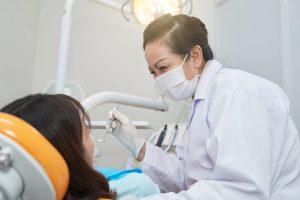Maintaining optimal oral health is crucial for overall well-being, and it requires a commitment to expert preventive care and routine check-ups. Good oral hygiene practices are essential in preventing dental issues such as cavities, gum disease, and enamel erosion. By adhering to a consistent oral care routine that includes brushing twice a day with fluoride toothpaste, flossing daily, and using an antiseptic mouthwash, individuals can significantly reduce their risk of developing these common dental problems. However, while diligent home care is important, it is equally vital to complement it with regular visits to a dental professional. Routine check-ups, typically recommended every six months, play a key role in early detection and prevention of dental issues. During these visits, a dentist can perform a comprehensive examination, checking for signs of decay, gum disease, and other potential problems that may not be visible to the untrained eye. Professional cleanings conducted during these appointments help remove plaque and tartar buildup that regular brushing and flossing alone cannot address.
 This langley dentist have proactive approach not only helps in preventing serious dental conditions but also ensures that any emerging issues are addressed promptly, minimizing the need for more extensive treatments in the future. Preventive care goes beyond just professional cleanings and check-ups. Dentists often provide valuable guidance on maintaining oral health, including advice on proper brushing techniques, diet modifications, and the use of dental products tailored to individual needs. For instance, fluoride treatments can strengthen enamel and protect against decay, while dental sealants can offer an extra layer of protection for the chewing surfaces of back teeth. Furthermore, personalized recommendations based on one’s specific oral health condition can help in managing and preventing issues such as sensitivity, bad breath, and tooth erosion. Another critical aspect of preventive dental care is the management of risk factors associated with oral health problems. For example, smoking and excessive alcohol consumption are known to increase the risk of gum disease and oral cancer.
This langley dentist have proactive approach not only helps in preventing serious dental conditions but also ensures that any emerging issues are addressed promptly, minimizing the need for more extensive treatments in the future. Preventive care goes beyond just professional cleanings and check-ups. Dentists often provide valuable guidance on maintaining oral health, including advice on proper brushing techniques, diet modifications, and the use of dental products tailored to individual needs. For instance, fluoride treatments can strengthen enamel and protect against decay, while dental sealants can offer an extra layer of protection for the chewing surfaces of back teeth. Furthermore, personalized recommendations based on one’s specific oral health condition can help in managing and preventing issues such as sensitivity, bad breath, and tooth erosion. Another critical aspect of preventive dental care is the management of risk factors associated with oral health problems. For example, smoking and excessive alcohol consumption are known to increase the risk of gum disease and oral cancer.
Dentists can provide support and resources for individuals looking to quit smoking or reduce alcohol intake, which in turn contributes to better oral health. Additionally, conditions such as diabetes can have a significant impact on oral health, making regular check-ups essential for monitoring and managing any related complications. Incorporating preventive care into one’s routine not only protects the health of teeth and gums but also contributes to overall health and quality of life. Poor oral health has been linked to various systemic conditions, including heart disease and diabetes, highlighting the importance of maintaining good oral hygiene practices and staying current with dental appointments. By investing in expert preventive care and routine check-ups, individuals can enjoy the benefits of a healthier mouth, a brighter smile, and a greater sense of confidence, knowing they are taking proactive steps towards their overall health and well-being.
